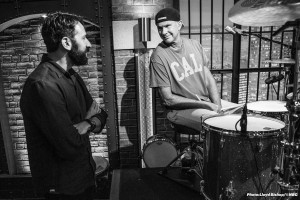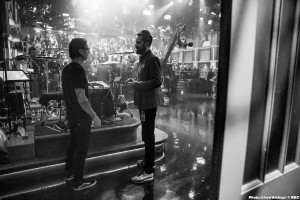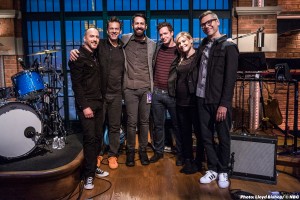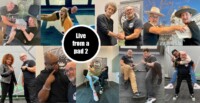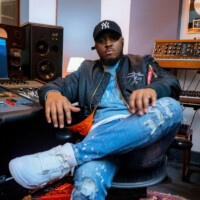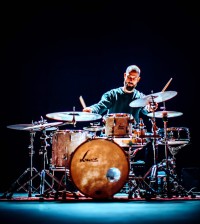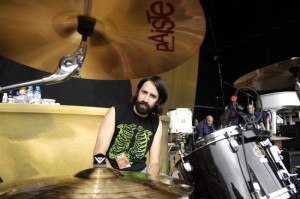 Eric Leiderman truly is a drummer at heart. With a couple of years international touring under his belt, he’s had a good dive into the life of a professional drummer; but ultimately desiring a stable lifestyle he decided against an uncertain career in the music industry and opted for TV.
Eric Leiderman truly is a drummer at heart. With a couple of years international touring under his belt, he’s had a good dive into the life of a professional drummer; but ultimately desiring a stable lifestyle he decided against an uncertain career in the music industry and opted for TV.
Today, Eric is the producer of one of America’s most successful late night talk shows: Late Night with Seth Meyers on NBC.
Due to band leader Fred Armisen’s busy schedule (first in his roll as guitarist and then switching over to drums), Leiderman had to come up with an idea to fill the drum chair and saw his chance to finally ‘give the drummer some’.
So over the last two years he invited some of the worlds top drummers to fill in and so far has secured names like Keith Carlock, Vinnie Colaiuta, Stanton Moore, Abe Laboriel, Jr., Dave Lombardo, Nicko McBrain and Thomas Lang – just to name a few.
I Skyped Eric at his home in New York to chat about how the idea was born, how the house band works and his personal connection to drums.
How did the idea come about?
After living in Los Angeles for 12 years as a freelance TV producer and writer (and musician), going from show to show, I accepted my current job here at Late Night with Seth Meyers, where I oversee several departments. Prior to this, a typical show would last three months (or a “season”) and then the show might come back or not, so that “what if” life was always conducive to being full time musician working on my own original bands. When I think about, I was actually quite good at “producing” my life to accommodate all of these potential paths!
When I came on and got this job in 2013, I had to move from my home of almost 13 years, Los Angeles, in about 3 days. Late Night had about two and half months before launch and there was a show to build. So yeah, there wasn’t a ton of time (as is always the case with a new show) but luckily Fred Armisen was in charge of curating the house band. I got to help him with that, which was an exciting thing to partake in right off the bat.
As the show evolved, Fred decided to move back to drums from guitar but he’s such a super talented and busy guy that his schedule doesn’t allow for him to be there week after week. Initially, we used a great local NYC guy for a time, but seeing Fred’s big, vacant drum seat, I pitched the idea of getting this or that guy – and ultimately, I just decided to go for bigger guys. Having tasted the professional drummer world with a couple of years touring under my belt I knew a couple of cats through that, my endorsers and friends in common. My attitude was simple and my producer instincts kicked in: why not ask? So I did!
Fred is always there to kind of approve and if there was someone he hadn’t heard of, I would pitch them to him. Now that we’ve really worked out Fred’s schedule, which is him coming in every couple of weeks, we really have a system in place where I can go after the top players in the world – whether they are session guys or rock players, metal, country, jazz, any genre. Remember, the 8G Band is a rock band at the core but we are always trying to branch out and expand what kind of drummer could do the gig. There are no rules on who can or cannot do the gig, and the support from Fred, The 8G Band and of course Seth and our showrunner Mike Shoemaker has just been fantastically consistent about letting me do this for the show, and of course, drummers.
As much as comedy in general (and this world of late night talk) is based on humour, it’s serious – and to make sure this drummer is great week after week and the band is happy is serious business. It’s been going really very smoothly, knock on some Bubinga-Birch [turns around and knocks on the drum kit behind him].
It’s been going for quite a while now, right?
We had a great New York based player, Matt Schulz come in and do it when Fred wasn’t there. Because he was local he would just always jump in when Fred’s schedule shifted. I think that was late 2014. By the time spring 2015 rolled around we had Chad Smith and John Theodore, and I was going for those rock guys right away. So at this point, I feel like we’re at a solid two years of this being a thing.
I remember in the very beginning when Fred wasn’t there on guitar we had Annie Clarke and J Mascis fill in. Looking back, that was probably the initial seed for the “celebrity” fill in idea. We just need someone to fill Fred’s big shoes.
Being a drummer by heart yourself, is this a bit of a childhood dream come true shaking hands with all these guys?
I had a friend from my hometown of Chicago in last week whom I’ve known since high school and that week we had Nicko McBrain from Iron Maiden sitting in. During the studio rehearsal, I’m giving Nicko notes on how the gig works, the usual routine of how I do my job, then later we all went to dinner. Normal day for me. But the idea of me telling these guys, the legends and personal heroes what to do (and they’re definitely looking for direction by the way because they want to nail the gig) is a strange thing. So at the end of the night, my friend just says: “Leiderman, your gig is crazy.” And I kind of shrugged because to me, it’s my daily routine but I realized it came off as jaded, which I’m anything but.
But fact is, for me it’s all normal by now, but I was reminded by my friend that it actually is a big deal. If I ever forget what my life is, I just look at my stick and head collection from all these cats. My drumstick and head collection was solid even before I started this but now I have a cherished collection that grows weekly! Since I was nine years old, it’s really only been about hard rock, heavy metal, grunge, and as a result my passion and knowledge lies here with rock music and rock drummers. I strive to remember all the other genres of players and am always branching out.
The world of drummers is deep and I’m just getting started, but even having guys like Keith Carlock or Mark Guiliana was mind blowing. I didn’t grow up with those guys specifically, but I got turned onto them through other players or drum geeks, check ‘em out, then get them booked. To see them here in the person, operating at that insane level, well, I just can’t believe it. I feel very lucky and fortunate to do this and it really is nerdy at the highest level.
How does it work when a guest drummer comes in?
They always come in for a week. We don’t have a lot of people asking if they could come for a day but you have to remember you’re giving the band a new heart beat every week. There is one thing changing the guitar player but with the drummers we know you’re changing the literal pulse, and that’s no small potatoes. Maybe I’m biased, but the band agrees and with a daily show, the less variables the better.
There are specific cues and the drummers have to be nailing it, as there is no room for error. We can clean a few things up in edit as the show is going out a couple of hours later but the band needs to feel comfortable and it has to feel tight. A week long stint is the bare minimum for that.
Any favourites so far?
I think as far as favourite guys go, if you think about who is best for the gig, who can do the covers, understand the cues and time all the stuff right, the band and I most always agree. Atom Willard, the drummer for Against Me! who is incredible; Matt Cameron has been with us a couple of times; Abe Laboriel, Jr. came in and just nailed it. He was just one of the guys where I really didn’t have to explain much, he just came in, understood the gig and the cues and his feel is unreal. You know, sometimes guys come in who have just done their own band for years and are used to playing shows with THAT band. Understandably it takes a minute to adjust. You’re not up there pounding and sweating through a show. It’s very start and stop and you never get warm, plus the studio is kept relatively cool because no one wants to sweat on television!
For example ‘Against Me!’ was on the show and Atom was also sitting in that week. To see him go from behind our kit doing the relatively reserved and guided playing the show requires to then getting up with Against Me!, taking off his glasses and just crushing it, hitting the drums hard was amazing. He keeps his hats high and I realized at that moment, “Oh that’s why his hi hat is up there!” It was a really joy to see him do both roles so seamlessly.
John Theodore always kills too. Janet Weiss from Sleater-Kinney came in and watching her do that gig was awesome for me.
Nicko McBrain last week just had everyone absolutely in love. He made it very easy and gave just as much as he got from everyone.
Brann Dailor was awesome, with both his personality and precise metal playing translating for the show perfectly. John Tempesta nailed it, too. Thomas Lang who I really think is the best clinician in the world. That guy is just a master. And then you hear him do a little something with his feet or some crazy thing with his hands and you see the band smile and they’re all gelling. That was amazing.
It’s hard for me to drop everyone’s names but really, everyone is memorable and brings something to the table for both myself, the band and of course the audience in the studio and at home. I would have to go through my whole scrapbook to recall everyone properly!
I can tell you though that 97-98% of the people were great and figured it out. And the other few who were a little wobbly, it was still a great learning experience. There are never any bad ones.
You mentioned some guys play their band’s own tunes. Do they use original material a lot?
Everything that the 8G band does, all the music they play are original compositions. When the band comes in each day, they write original tunes. The opening and closing theme are obviously the same each show (Fred wrote the opening theme, the band wrote the closing theme with him). Now they’re not gonna write eight to ten small little riffs each day but at least half of the tunes are new every day. When a drummer comes in and they’re from a band for example, they would maybe take the bands songs and ultimately make cover versions. They don’t do covers all the time because creating an original band with the drummers feel and vibe is what makes it exciting for the band, and the audience notices it too. So for example when we have Thomas Lang in doing this original material he created with the 8G Band, by day three or four when the drummer is TRULY comfortable, they would write an original with breaks and Thomas would just rip all over it. It’s amazing!
That’s the kid and drum-nerd in me watching the band gel right there, week after week with a new drummer reinventing itself with these original tunes. Eli and the band (it’s Eli Janney on keys, Syd Butler on bass, Seth Jabour and Marnie Stern on guitars), really have learned how to write for the drumming style of each drummer who sits in. When we had Patrick Carney there were lots of big, fat rock shuffles. I don’t wanna say that week sounded like the Black Keys but you hear the signature sound of Patrick Carney driving it – that’s what he does. For Jimmy Chamberlin they wrote big riffs around him but also the subtle nuanced jazzy playing with huge fills that he was allowed to do and defined Smashing Pumpkins.
This is a whole ‘other conversation but I will say that I’ve always known – and my goal is to get people to realise this – no matter how great the song is, without those signature drummers and their corresponding written parts, those players and their playing choices were essential to truly making and breaking the overall success of those bands.
That sounds like a lot of rehearsal time.
Man, they’re pros. So much credit goes to The 8G Band and Eli who’s the Associate MD, I wanna be very clear about that. They rehearse for like an hour and a half in a tiny room with an electric kit; record everything and then they go away until studio rehearsal. I never bother them at rehearsal but I assume that if they have a bad day where it’s not all flowing, they just go back to this treasure chest of riffs that they have – which is definitely in the thousands by now.
They really have it down and I’m giving them so much credit for putting a set list together every day – especially if there are short notice changes to the show – and for accommodating all these drummers. They really have turned into a high functioning musical unit and truly are “the best band in late night”, as Seth always tells the audience.
How much music do they need per show?
The show is about 43 minutes long and there are six acts. We’ve been on the air for just over three years, and I think we’re around 505 shows that we’ve done. We tape the show 4 days a week and we’re on the air for about 40 weeks a year. When you think about all these numbers it really adds up.
It’s hard to say how much music they need though. Sometimes they support a comedic sketch that needs original music and they have to work on it early in the week and then fine-tune it. We also had drummers in who then had a scripted line in a sketch. Whatever the show needs, the band is there to support it. But yeah, there are maybe seven or eight pieces of music. That all goes back to the mental opinion about rehearsals. A daily show and what an easy grind it becomes is a whole ‘nother interview. It’s like touring. I personally love the known schedule of that. it feels very comfortable and I think the band feels that way too. By the end of the week the guest drummers always go: Man, this is the best gig! I don’t think I ever had anyone who didn’t wanna come back.
Who do you have coming up? Are you allowed to say?
I always make sure we have Fred in as much as possible but his schedule shifts a lot. Once I know that I try lock things down. This week I have Charlie Benante coming in; then I have Fred the week after; and then I have Jonathan Mover. After that I haven’t booked anything else as we’re off for two weeks.
We’ve also done a bunch of vocal sit ins which were really cool and add to the very cool experimentation angle we believe in for the 8G Band. Emily Armstrong of Dead Sara, Bob Mould played guitar and sang, Elle King, Lucius and more to come.
Every time Fred is here we’re trying to get vocalists in and keep those experiences unique for the band and most importantly, the audience.
And you’re not tempted to take the throne yourself for a week?
For me to sit in? I don’t know what we would do if there was an emergency situation. Either we would do the show without a drummer or I would do it. But during the show I have lots of other responsibilities going on. My first job here is to help produce the show. I love sitting in screwing around with the drummers, talking about tone, tuning, gear, drum stories and that stuff – that’s the big thrill for me. I don’t need the ‘on-camera-ness’ of it.
This is a very important point: It’s about the show first. Nobody watches it to see Eric Leiderman on drums and I’m good with that. Could I do the gig and nail it? Totally. But what I’m trying to do is get the best players in the world to play with the best late night band in the world on the best late night talk show in the world.
You’re talking about drums with such a passion. Why TV producing instead of pursuing a full time drumming career?
All my 20s and early 30s was being sensible person of ‘you need a day job’. I didn’t wanna be like all these guys just waiting for the next gig or doing shows for 25 bucks, that’s just the way I am. I had to have a safety net, my parents raised me that way, and I didn’t want to be dependent on the music scene. And also I’m not that good. I didn’t have the drive or ethic to sit in a room and just drill rudiments, you know what I mean? I definitely have a natural thing for it, I love it, but I also wanted to do other things. If my original band broke and fell into that opportunity, I would definitely have put that first. I had a couple of sparks here and there and a couple of amazing shows I still remember fondly. Then when I got the gig with Pearl, I started to get endorsed, got to see the world and play big stages. That was a couple of years of my life. I got to do that – some people don’t even get close to looking back at these opportunities.
When it went away, that’s when I truly focused on only getting gigs as a TV producer. After I got the offer to be a producer on Late Night, that’s when I moved from Los Angeles to New York and went for the stable life. I was kind of tired of toeing the line and this really is my dream job.
Again, if my original band would have had a break, I would have kept at it but not till I was dead broke and just waiting for the next thing. There is a line for me. I never stopped going to shows though, I still really love music.
You also were a judge at the legendary Guitar Center Drum-Off this year. How was that?
Yes, Thomas Lang connected me to that. It was really fun! There were loads of other drummers just hanging out and to be around this celebration of drummers is fantastic. The producer part of me kicked in though: How else could we do this? What else could we add in? So I had to remind myself that I was there not to work but to judge talent. Then they went: “Here’s a gift bag for judging” – Oh, I guess I’m really not working!
Yeah, it was really cool. I give big credit to Guitar Center for doing that. I wish we had more things like that and I wish they would be as huge of a production as the Drum-Off is. It would be great if they could make it bigger and take it globally and really just tie in with what I do, which is giving the drummer some. There are so many people I know who do things for drummers but it always feels like we could do more, make them the centre of attention and remind people of how cool drums are.
Thanks a lot for your time Eric!
Interview by Tobias Miorin
May 2017

